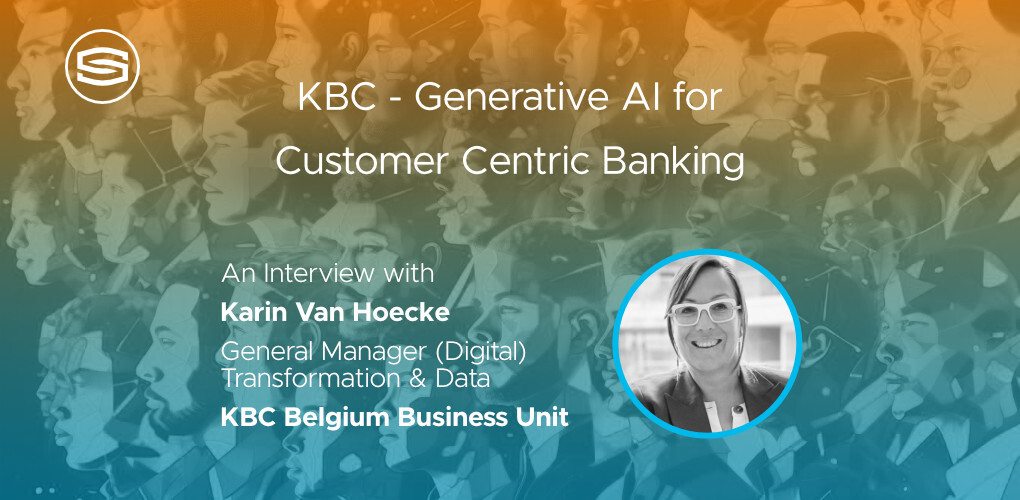
Insights & Opinions
KBC - Generative AI for Customer Centric Banking
Mon, 01 Jul 2024


Karin Van Hoecke, General Manager (Digital) Transformation & Data at KBC Belgium Business Unit is no stranger to artificial intelligence or the banking scene. She was our guest on a virtual afterwork session back in November 2020, when she shared with us the strategy and vision behind KBC’s ai-powered personal digital assistant, Kate.
We have been following Kate’s progress ever since, checking in for a progress update back in 2022 with Katrien Dewijngaert, General Manager Strategy & Transformation at KBC Insurance (Belgium Business Unit). At that time, Kate was already firmly at the centre of KBC’s strategy and the number of customer interactions with KBC had increased as a result.
So, I was eager to hear Karin’s thoughts about the latest developments in Generative AI, and how it might shape future strategy both for Kate and in the financial services industry in general.
Embracing Generative AI at KBC
Karin outlined KBC’s strategic approach to incorporate AI across various facets of its operations, from claims management to leads and from customer service enhancements to operational efficiencies. "We already integrated some Generative AI components in Kate and are further exploring the possibilities", she shared, highlighting KBC’s proactive stance towards this transformative technology.
One innovative application is where KBC uses Generative AI to either clarify or to summarise long and complex customer questions. Another application involves leveraging Generative AI to provide 'hybrid answers’. This functionality enhances Kate's ability to guide users not only through direct interactions but also by fetching and interpreting information from the publicly accessible KBC's website (www.kbc.be). For instance, if a customer inquires about ItsMe, e.g. "I want more information about ItsMe" or "how does ItsMe work", Kate uses Generative AI to parse through the KBC website data and deliver a concise, informed response.
The beauty of this approach is that the required information is already available on the publicly accessible KBC website (www.kbc.be). The Large Language Model uses this data scraped from the KBC website to provide an enhanced customer experience, reducing the effort required by the customers to find the information themselves.
This kind of low risk use case is a perfect starting point for bank-insurers looking to leverage Generative AI without fear of falling foul of regulation – a point that was recently reinforced during a panel session at The Banking Scene Conference in Brussels.
Controlled Experimentation and Staff Engagement
At KBC, the deployment of Generative AI is approached with a blend of enthusiasm and caution, reflecting a commitment to maintaining trust and security. "We only implement and deploy AI in a controlled way, and generally publicly available open AI models (like ChatGPT) are not accessible because of security reasons", Karin explained, underscoring the importance of a secure and trustworthy implementation as would be expected of a bank.
On the other hand, Karin emphasised that despite these restrictions, KBC fosters an environment of learning and innovation as they recognise the desire to understand how Generative AI could be of use in the bank and insurance company. They facilitate this e.g. by allowing a select group of a few hundred employees across the KBC Group in a pilot program with Microsoft on their M365 Copilot product, which helps to summarise meeting minutes, find back information more easily and increase overall personal productivity. Enabling these employees to explore potential applications in a controlled setting, to get hands-on experience on things like prompting and to get a grasp of the impact AI models can have on existing processes.
Ethical Frameworks and Governance
The ethical use of AI is a cornerstone of KBC’s strategy since even before the time of Kate. Each AI use case undergoes rigorous evaluation within established ethical frameworks, ensuring that the technology aligns with the bank-insurer's core values and regulatory requirements. "We already have an ethical framework in place to ensure that the output of the AI models we are using is trustworthy ... we are on the careful side," said Karin, highlighting KBC’s diligence in integrating AI responsibly.
Regulatory Landscape and Innovation
Discussing the broader regulatory environment, particularly the European AI legislation, Karin expressed mixed feelings. While she appreciates the clarity some guidelines provide, she is concerned that the complexity and burden of additional requirements might stifle innovation rather than foster it.
She fears that in the future, there potentially might need to be a whole new business function dedicated solely to understanding which part of the regulation applies to each part of your AI implementation. "It's very good if they would say black and white ... but I fear we are back again in complexity," she reflected, advocating for a balance between clear regulations and the freedom to innovate.
The Future of Banking and Insurance with Generative AI
Karin is widely recognised in the industry as a visionary and thought leader, and in the closing minutes of the interview, I asked for her personal view on where she thought the potential lies for Generative AI to make the greatest impact in banking.
While Karin recognises the transformative potential of Generative AI in banking and insurance when it comes to efficiency and productivity, she is especially optimistic about the ways it could enhance customer interactions and increase customer centricity.
She envisions a future where personal digital assistants like Kate not only perform functional tasks, but also enrich the customer experience with interactions that feel more personal and engaging. "I think the potential is there to create great experiences for customers, and that gives me energy," she said, going on to suggest that AI could eventually replicate the kind of trusted, personalised advice once offered by human bank managers – which is completely aligned with my own vision of “The AI Bank Manager of The Future” that I wrote before starting this series of interviews.
Conclusion
Overall, I got the impression that Karin’s feelings of Generative AI are that it’s not quite as groundbreaking as the hype would lead you to believe, and that it should rather be viewed as an incremental improvement to existing AI, not as a standalone technology.
Her insights reveal a thoughtful and strategic approach to incrementally integrating Generative AI at KBC. By prioritising ethical considerations, fostering controlled experimentation, and navigating the complex regulatory landscape, KBC is positioning itself at the forefront of AI-driven banking and insurance innovation.
As Generative AI continues to evolve, its capacity to enhance customer service, improve operational efficiency, and redefine the banking and insurance experience remains a compelling narrative, promising a future where technology and human expertise converge to deliver unparalleled service in the financial services sector.
(Download our white paper "Generative AI in Benelux Banking: Opportunities, Challenges and Future Outlook" for a consolidated collection of insights shared by Benelux bankers across 1:1 interviews, keynotes, panels and executive round tables we hosted.)



